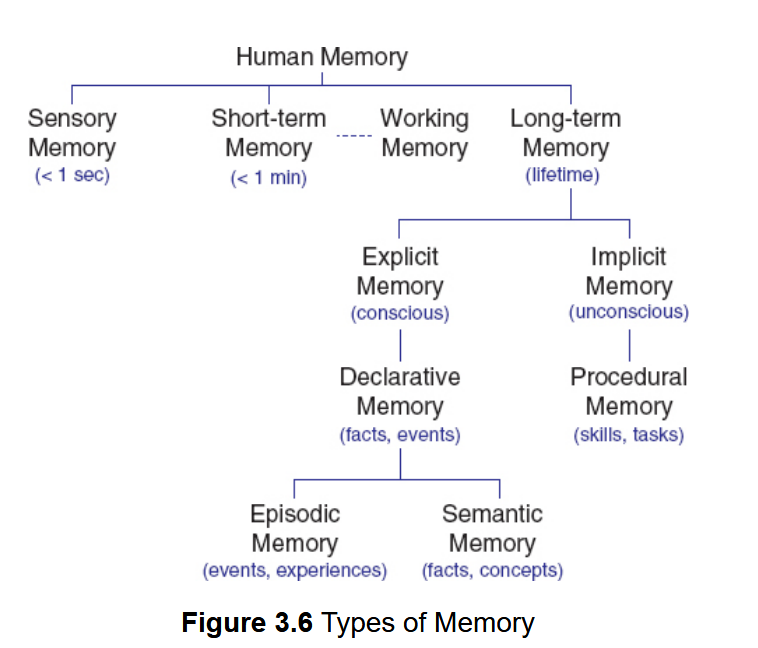MCAT Behavioral Sciences Review - Ch. 3+4: Learning and Memory; Cognition, Consciousness, and Language
1/35
There's no tags or description
Looks like no tags are added yet.
Name | Mastery | Learn | Test | Matching | Spaced |
|---|
No study sessions yet.
36 Terms
Learning + classical conditioning
Stimulus
Habituation
Subthreshold
Dishabituation
Associative learning (classical + operant conditioning)
Unconditioned stimulus/response
Neural stimuli
Conditioned stimulus/response
Acquisition
Extinction
Spontaneous recovery
Generalization
Stimuli discrimination
Operant conditioning
Behaviorism
Reinforcement
Reward-seeking behaviors
Positive/negative reinforcers
Escape learning
Avoidance learning
Primary/secondary reinforcer
Conditioned reinforcer
Discriminative stimulus
Punishment
Punishment
Positive punishment/aversive conditioning
Negative punishment
Reinforcement schedules
Shaping
Factors in Associative Learning
Latent learning
Problem solving
Preparedness
Instinctive/instinctual drift
Observational learning
Mirror neurons
Modeling
Encoding
Automatic processing
Controlled (effortful) memorization
Visual + acoustic + elaborative + semantic encoding
Self-reference effect
Maintenance rehearsal
Mnemonics
Method of loci
Peg-word system
Chunking/clustering
Storage
Sensory memory
Iconic memory + echoic memory
Whole-report vs. partial report
Short-term memory
Memory capacity, 7±2 rule
Hippocampus
Working memory
Memory
Long-term memory
Elaborative rehearsal
Implicit memory/nondeclarative memory
Procedural memory
Priming (positive vs. negative)
Explicit/declarative memory
Episodic memory
Semantic memory
Autobiographical memory

Retrieval
Retrieval
Recall
Recognition
Relearning
Spacing effect
Semantic network
Spreading activation
Recall cue
Context effect
Source monitoring
State-dependent memory/effect
Serial-position effect (primary + recency effect)
Forgetting + Brain Disorders
Amnesia
Source amnesia
Alzheimer’s disease
Dementia
Neurofibrillary tangles
Beta-amyloid plaques
Korsakoff’s syndrome
Retrograde amnesia
Anteretrograde amnesia
Confabulation
Agnosia
Decay
Retention function
Interference
Interference effect
Proactive vs. retroactive interference
Aging and Memory
Prospective memory
Reproductive memory
Reconstructive memory
False memory
Recovered memories
Misinformation effect
Intrusion errors
Source-monitoring error
Neurobiology of Learning and Memory
Neuroplasticity
Neural plasticity
Synaptic pruning
Synaptic cleft
Long-term potentiation
Cognition
Dual-coding theory
Verbal association + visual images
Information processing model (4 components)
Cognitive development
Abstract thought
Piagetian development
Schema
Adaptation (along w/ assimilation + accommodation)
Sensorimotor, preoperational, concrete operational, formal operational
Sensorimotor Stage
Circular reactions
Primary circular reactions
Secondary circular reactions
Object permanence
Representational thought
Preoperational Stage + more
Symbolic thinking
Egocentrism
Conservation
Centration
Concrete operational stage
Formal operational stage
Hypothetical reasoning
Cognitive Changes in Late Adulthood
Lev Vygotsky
Fluid intelligence
Crystallized intelligence
Activities of daily living
Dementia
Problem Solving and Decision Making
Mental set
Functional fixedness
Trial-and-error
Algorithms
Deductive reasoning
Inductive reasoning
Heuristics
Availability heuristic
Representativeness heuristic
Base rate fallacy
Bias and Overconfidence
Disconfirmation principle
Confirmation bias
Overconfidence
Hindsight bias
Belief perseverance
Intuition + recognition-primed decision model
Emotion
Theories of Intelligence
Multiple intelligences
Interpersonal vs.intrapersonal intelligence
Sternberg’s triarchic theory of human intelligence
Analytical intelligence
Creative intelligence
Practical intelligence
Emotional intelligence
Variations in Intellectual Ability
Intelligence quotient (IQ)
Stanford-Binet IQ test
States of Consciousness
Consciousness
Alertness
Physiological arousal
Reticular formation
Stages of sleep
Electroencephalography (EEG)
Alpha/beta/theta/delta waves
Stage 1, 2,
Sleep spindles
K complexes
Slow-wave sleep (SWS)
Non REM sleep
REM sleep/paradoxical sleep
Sleep Cycle
Circadian rhythms
Melatonin
Pineal gland
Cortisol
Adrenal cortex
Corticotropin-releasing factor (CRF)
Adrenocorticotropic hormone (ACTH)
Activation-synthesis theory
Problem solving dream theory
Cognitive process dream theory
Neurocognitive models of dreaming
Sleep-Wake Disorders
Dyssomnias
Parasomnias
Insomnia
Narcolepsy
Cataplexy
Sleep paralysis
Hypnagogic
Hypnopompic hallucinations
Sleep apnea
Night terrors
Sleepwalking/somnambulism
Sleep deprivation
REM rebound
Hypnosis
Hypnotic induction
Meditation
Alcohol
Depressants
Alcohol
GABA
Disinhibition
Alcohol myopia
Wernicke-Korsakoff syndrome
Sedatives
Barbiturates
Benzodiazepines
Stimulants
Amphetamines
Cocaine + Crack
Ecstasy (or, MDMA)
Opiates + Opioids
Opium
Opiates
Opioids
Heroin
Hallucinogens
Lysergic acid diethylamide (LSD)
Marijuana + Drug Addiction
Tetrahydrocannabinol (THC)
Mesolimbic reward pathway
Nucleus accumbens (NAc)
Ventral tegmental area (VTA)
Medial forebrain bundle (MFB)
Attention
Sensorium
Selective attention
Cocktail party phenomenon
Dichotic listening tasks
Shadowing
Divided attention
Controlled (effortful) processing
Automatic processing
Language
Phonology
Phonemes
Categorical perception
Constancy
Morphology
Morphemes
Semantics
Syntax
Pragmatics
Prosody
Language Development
Babbling
Naming explosion
Overextension
Errors of growth
Nativist (biological) theory
Transformational grammar
Language Acquisition Device
Critical period
Sensitive period
Learning (behaviorist) theory
Reinforcement
Social interactionist theory
Whorfian hypothesis (linguistic relativity hypothesis)
Brain Areas and Language
Broca’s area
Wernicke’s area
Arcuate fasciculus
Aphasia
Broca’s (expressive) aphasia
Wernicke’s (receptive) aphasia